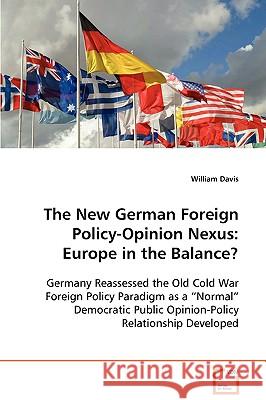The New German Foreign Policy-Opinion Nexus: Europe in the Balance? » książka
The New German Foreign Policy-Opinion Nexus: Europe in the Balance?
ISBN-13: 9783639090413 / Angielski / Miękka / 2008 / 72 str.
The New German Foreign Policy-Opinion Nexus: Europe in the Balance?
ISBN-13: 9783639090413 / Angielski / Miękka / 2008 / 72 str.
(netto: 209,23 VAT: 5%)
Najniższa cena z 30 dni: 219,69
ok. 10-14 dni roboczych
Bez gwarancji dostawy przed świętami
Darmowa dostawa!
After the end of the Cold War and unification with the former East German GDR, Germany maintained the policy alliance paradigm with the US. However, with the 2002 opposition to the US on UN Security Council resolution 1441 on Iraq, this relationship appeared to change. Does the German decision on Iraq indicate a new foreign policy direction and what accounts for this possible change in Germany? Exogenous and endogenous factors including US policy, EU integration, Unification/Growing German self-assurance, and the opinion-policy relationship typical for advanced democratic countries are examined. Scholars of democracy have suggested that policy outputs follow public opinion in advanced democratic countries. Using time-series statistical regression analyses, I test the opinion-policy nexus in Germany with regard to the US foreign policy relationship. I find that along with several contributing factors, post-unification changes in the German electorate allowed for a reassessment of the old foreign policy paradigm as a normal opinion-policy relationship developed in post-Cold War Germany. From a realist s systemic perspective however, German behavior looks a lot like balancing."
After the end of the Cold War and unification with the former East German GDR, Germany maintained the policy alliance paradigm with the US. However, with the 2002 opposition to the US on UN Security Council resolution 1441 on Iraq, this relationship appeared to change. Does the German decision on Iraq indicate a new foreign policy direction and what accounts for this possible change in Germany? Exogenous and endogenous factors including US policy, EU integration, Unification/Growing German self-assurance, and the opinion-policy relationship typical for advanced democratic countries are examined. Scholars of democracy have suggested that policy outputs follow public opinion in advanced democratic countries. Using time-series statistical regression analyses, I test the opinion-policy nexus in Germany with regard to the US foreign policy relationship. I find that along with several contributing factors, post-unification changes in the German electorate allowed for a reassessment of the old foreign policy paradigm as a “normal” opinion-policy relationship developed in post-Cold War Germany. From a realist’s systemic perspective however, German behavior looks a lot like balancing.











